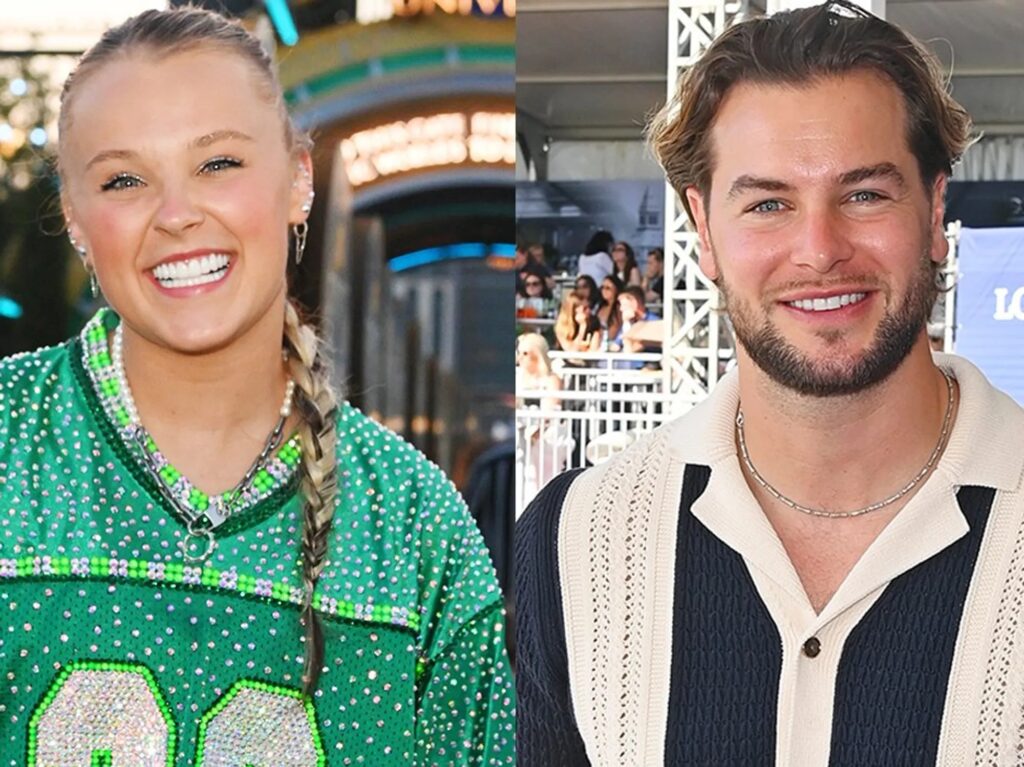In the swirling landscape of celebrity culture, where blurred boundaries and constant speculation reign supreme, JoJo Siwa and Chris Hughes have emerged as the latest subject of public fascination. What began as an unlikely pairing of reality TV alumni from opposite sides of the Atlantic has evolved into something more enigmatic—something that fans and critics alike can’t seem to look away from.
On paper, JoJo Siwa and Chris Hughes seem like an odd couple. Siwa, the 22-year-old American pop performer and former Dance Moms star, has been in the public eye since childhood. She’s loud, colorful, and proudly unconventional. Hughes, 32, is best known for his stint on the UK’s Love Island, where he made headlines for his charming demeanor and tumultuous relationships. The two met on Celebrity Big Brother UK, forming a close friendship that has since spilled over into the real world in very public, very cryptic ways.
Now, fans are scrutinizing every Instagram post, every interview, and every concert shoutout for clues about what their relationship really is. Are they dating? Are they friends? Or is this a carefully orchestrated publicity maneuver? And perhaps more importantly—why do we care so much?
Let’s unpack the mystery.
When Siwa and Hughes appeared together on Celebrity Big Brother, their on-screen chemistry was hard to miss. They shared jokes, inside glances, and emotional support, with Chris notably stepping in to defend JoJo when tension flared among other castmates. It was an alliance that stood out amid the usual chaos of reality television—a genuine bond, perhaps.
After the show ended, their connection didn’t fizzle out. In fact, it intensified. The two began appearing on each other’s social media, traveling together, and exchanging affectionate comments online. Siwa posted sweet birthday wishes to Chris, while he shared snaps of the two laughing over dinner or lounging poolside.
And then came the kiss—caught on camera at a Universal Studios event. Fans exploded with excitement, confusion, and debate. Was this a moment of spontaneous affection? A joke? Or confirmation of what many had suspected all along?
One of the most talked-about moments came at JoJo’s recent London concert, where she dedicated the classic ’80s hit “Bette Davis Eyes” to none other than Chris Hughes. Mid-performance, she changed the lyrics to “Chris Hughes’ Eyes,” smiled coyly at the audience, and confessed that she’d spent the morning with him. Then, near the end of the show, she told the crowd she felt “incredibly loved.”
Naturally, the internet spiraled. Fans shared clips of the moment across TikTok, X (formerly Twitter), and Instagram, with captions ranging from “they’re so obviously in love” to “this is either genius PR or a modern love story.”
But even as speculation reached fever pitch, JoJo maintained that their relationship is platonic. “He’s one of my closest friends,” she stated in a recent interview. “People can’t seem to accept that love doesn’t always look one way.”
Chris, too, has brushed off dating rumors, though he’s called JoJo “a very special person” and admitted that their friendship is “unlike any other.”

So why aren’t fans buying it?
The public obsession with Siwa and Hughes taps into something deeper than just curiosity about celebrities. According to experts, part of our fixation comes from the blurred lines between celebrities and everyday people in the social media age.
“In the past, there was a clearer boundary between celebrities and the public,” explains Chase Cassine, a licensed clinical social worker. “Now, social media has made those lines incredibly porous. We follow their lives in real-time, feel connected to them, and project our own emotions and expectations onto them.”
That’s especially true for someone like JoJo Siwa, who’s essentially grown up in front of the camera. Millions have watched her transformation from a bedazzled, bow-wearing kid to an outspoken LGBTQ+ artist trying to redefine pop stardom on her own terms. Any shift in her image, behavior, or relationships feels personal to her audience.
“When people evolve in ways that don’t fit the labels we’ve assigned to them, we tend to feel confused or even betrayed,” says Amy Morin, a psychotherapist and author. “We like clarity and consistency. When someone like JoJo starts acting outside of the box we’ve put them in, it sparks a desire to investigate and make sense of it.”
Adding fuel to the fire is JoJo’s recent breakup with Kath Ebbs, who publicly accused her of emotional cheating—presumably with Hughes. Though Siwa hasn’t directly addressed those claims, the timing of her growing closeness with Chris hasn’t gone unnoticed.
Critics have also questioned whether the entire relationship is a publicity stunt. With JoJo launching a new music era and Chris dabbling in new media projects, skeptics see the pairing as a strategic move to stay in the headlines.
“JoJo Siwa knows how to stay relevant,” says Melvin Williams, an associate professor of communication at Pace University. “She’s been doing this since she was a kid. Whether you love her or hate her, she understands how to hold the audience’s attention.”
But even if some of the attention is calculated, does that make the relationship any less real? Or is it just another example of how modern celebrity lives unfold in full view, with authenticity and performance constantly overlapping?
One of the more complex layers to this story is JoJo Siwa’s evolving understanding of her own sexuality. When she came out in 2021, it was a defining moment for many fans. She embraced the label of pansexual, posted about her same-sex relationships, and even proclaimed that she “invented gay pop.”
Now, her emotional closeness with a man has left some fans feeling unsettled—or worse, betrayed.
“We love labels because they help us make sense of people,” says Morin. “When someone steps outside of the label we’ve put on them, it causes discomfort. Are they changing? Were they not being honest before? Or are they simply more complex than we allowed them to be?”
For JoJo, that complexity is part of the journey. “I’ve always said that love is love,” she told fans during a livestream. “It doesn’t always have to look like what you expect.”
At its core, the JoJo and Chris phenomenon is about more than just a possible romance. It’s a case study in how we relate to public figures in the age of constant connectivity.
“We treat celebrity stories like mysteries,” says David Schmid, a cultural critic and professor at the University at Buffalo. “We look for clues, try to predict the outcome, and feel personally invested in the resolution.”
In that way, celebrity gossip isn’t just escapism—it’s collective storytelling. And it often reflects our own questions about identity, connection, and change.
“What does our fascination with JoJo and Chris say about us?” asks Dr. Janelle Peifer, a psychology professor at the University of Richmond. “Maybe it tells us we’re craving something—fun, drama, distraction, or maybe even validation. Their story gives us a lens to examine our own longings.”

As the speculation continues, it’s worth asking: Do we need an answer?
If JoJo and Chris are in a romantic relationship, they’ll say so in their own time. If they’re not, their bond still seems to be a source of joy and support in their lives. And perhaps that’s enough.
In an era where we demand transparency from celebrities but struggle to give them privacy, the story of JoJo Siwa and Chris Hughes offers a rare opportunity to step back. To let people be complicated. To allow friendships to be deep and affectionate without needing labels. And to reflect on why we feel so entitled to know everything in the first place.
Until we know more—or unless they choose to share more—their relationship remains a beautiful enigma. And maybe that’s exactly how it should be.



